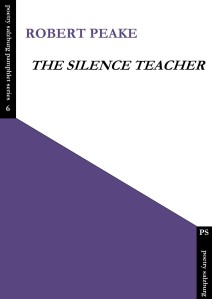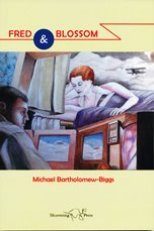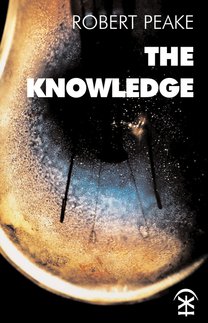‘The Silence Teacher’ by Robert Peake
-Reviewed by Afric McGlinchey–
The Silence Teacher explores the impact of an infant’s death, and the way perception is permanently altered as a result. Surviving for only a day, Peake’s newborn has left his ghost lodged in his father’s heart and mind. The child’s potential life, and associations with Peake’s own childhood, come crowding in, to drown out other possibilities for him.
Everything he perceives is observed through the veil of his grief. With his poems, he might be saying, as TS Eliot did, ‘these fragments I have shored against my ruins’. His sense of self appears to be that of barely manageable wreckage, the outside world a disparate, disorganized cascade of noise, stimuli, other selves – difficult for him to cope with.
But sometimes, something breaks through, as in the opening title poem, when a mother comes to offer condolences with her daughter, a deaf girl who has just received her first hearing aid. For the first time she has heard birds singing in a nest, and understood her mother’s mimed ‘tweet’. Her joy at this discovery, combined with an insight into what her deafness has meant up to now, swoops the poet back to the silence of the son’s heartbeat: ‘what that silence taught, and how it pressed.’
Causality is at work when the poetic vision includes not just the luminous and particular present moment, but antecedents and consequences. Childhood memories bend towards a resonance they didn’t previously have. A thirteenth pup, runt of the litter, rejected by its mother and adopted by the poet as a seven year old recalls the first emotion of caring for a helpless creature, before his ineptitude unfortunately led to the pup’s death.
‘I stabbed a pin in the tip of my sister’s doll bottle….
palmed you on your back and fed you like a new father,
nervous, doting, repulsed, stroking your minuscule paws.’
In ‘The Spider’, the poet as a child finds that ‘power is pleasurable’ and ‘true to Stanislavsky’s form….anger flashes up…and I think, for a moment, take that.’ Later: ‘I fold him in tissue, swipe the tile so clean/it is as if he were never there at all.’ These fragments of childhood memories accumulate to form a collage that gathers added meaning, a centre of gravity, in the light of subsequent events.
Peake’s descriptions brim with sensibility, but the sensibility does not obstruct or abstract the lucidity of the seeing. Associations infiltrate the scenes of his poems like groundwater.
These are quiet, restrained poems, written in the seven years since his son’s death. They reveal a sense of limbo, non-engagement with the world except in the most peripheral sense, but also develop until the poet is seeking ‘Twelve Reasons to Go On’ (for M.B.). Two examples:
‘3. The moment before falling asleep, when you are free.
11. Sticking an arm in my coat and finding a scarf.’
The psychological burden of this, and the courage required to make such an effort is sensitively conveyed in ‘Double Agent’:
‘Each morning, I make myself up.
I make up what I like: oranges,
say, or rhubarb, how I will walk,
I make up my friends, and reasons
for friendship, make up my love
for collecting small cars, I make
up a me someone can relate to,
and try to keep the “facts” straight.’
Control of his grief is transferred to his poems. There is no Ginsberg howl here. But there is transference, in the form of a Wild Man, who ‘comes down from the forest, smeared with mud, naked’, to accuse him of saying nothing about the transformation:
‘While the body of your child withered under incubator lights
his spirit blazed on the horizon like sun upon the sea
and still, you knew him, in your humbleness, his bright
distance, and understood yourself a flicker in that flame.’
(‘Visitation of the Wild Man’)
This poem blazes with energy, and the first possibility of coming to an acceptance.
For the most part, restraint is part of Peake’s representational ethic, and he turns to nature for his consolation and symbolism. There are birds, spiders, seasons, deer, crickets, the moon. But like the fish in an aquarium, he is also half-aware of other humans: in a waiting room, a bus, a barber’s, a concert hall, on a dock. Most heartbreakingly, hovering on the edges of his consciousness, is his wife, waiting for him to emerge from his grief. ‘The Instrument Is My Voice’ is written to her, and, after listening to a live performance of Bach by a maestro, in a moment of clarity, so attuned to the moment, he hears ‘notes of horsehair / and varnish fading into half a heartbeat / of silence before the applause.’ The attentiveness he has given to the music, he now turns to give his wife:
‘admiring you in the passenger seat, upright,
all buckled in, ready for the trip.’
A heartfelt, emotionally complex poem, it evokes the paradox of a relationship which is barely able to survive – perhaps unable – and yet:
‘our palms
are inscribed with the future, and curl
under latches and handles, even when locked.’
In another beautifully evocative poem, ‘How You Were conceived’, he uses the image of the mocking bird to convey his continuing need for her:
‘Mockingbird sings all night,
and if she did not answer,
I too would become frantic,
baroque, filling the air with trills,
to shorten the distance between silence
and the silence that has no reply.
She steps through the door, out of sight,
and a song gathers up in my throat.’
Ultimately, it is the cadence of tone and the lyrical imagery that render the emotive content of the poems. In this chapbook, Peake has shown his ability – and indeed, has the authority – to transmit the depths, layers and subtleties of the process of grieving. Such a vision springs from a different kind of aesthetic instinct than the merely perceptual. Peake describes moments as seen from his own state of grief, and so his perception of each event, combined with what lies deepest in his feelings, increases the reader’s comprehension of loss.
There are many kinds of poems in the world – and room for them – but poems like these bring things into focus for me. After reading The Silence Teacher, I have a more emotional stake in living, and in loving. A haunting collection.






Pingback: Afric McGlinchey Reviews The Silence Teacher
Thanks Robert. Appreciate the feedback and glad you were happy with the review!